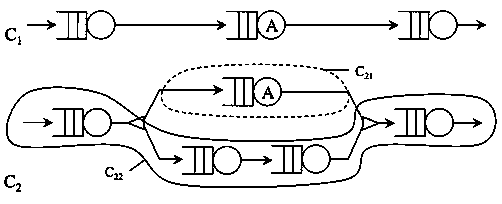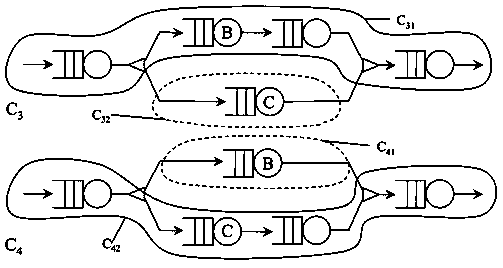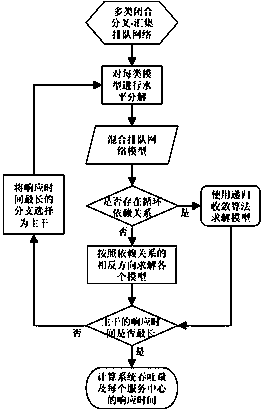Method for analyzing performance of multi-class closed fork-join queuing network based on horizontal decomposition
A queuing network and analysis method technology, which is applied in the field of performance analysis of multi-type closed fork-convergence queuing network models, can solve the problems of high complexity and inability to analyze the performance of multi-class closed fork-convergence queuing network models, and achieves The effect of improving efficiency
- Summary
- Abstract
- Description
- Claims
- Application Information
AI Technical Summary
Problems solved by technology
Method used
Image
Examples
Embodiment Construction
[0038] The present invention will be further described below in conjunction with accompanying drawing and embodiment:
[0039] The invention aims at multiple types of closed fork-and-converge queuing network models, and decomposes each type of non-product queuing network model including fork-closing operations into one closed and several open product queuing network models by using a horizontal decomposition method on a computer. The horizontal decomposition method is to parallelize the fork-collection N B Subtasks are split into a trunk and branches, where the backbone is determined by providing a reasonable initial value for the average queue length of each service center (e.g. , N is the total number of requests in the closed queuing network model, K is the total number of service centers in the closed queuing network model), so as to estimate the response time (Response Time) of each subtask, and set the subtask execution path with the longest response time as the tr...
PUM
 Login to View More
Login to View More Abstract
Description
Claims
Application Information
 Login to View More
Login to View More - R&D
- Intellectual Property
- Life Sciences
- Materials
- Tech Scout
- Unparalleled Data Quality
- Higher Quality Content
- 60% Fewer Hallucinations
Browse by: Latest US Patents, China's latest patents, Technical Efficacy Thesaurus, Application Domain, Technology Topic, Popular Technical Reports.
© 2025 PatSnap. All rights reserved.Legal|Privacy policy|Modern Slavery Act Transparency Statement|Sitemap|About US| Contact US: help@patsnap.com



